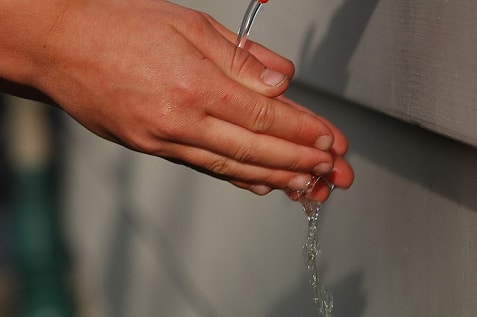Washing your hands is an integral part of regular hand hygiene and many health organizations always remind and promote the importance of washing your hands as the first line of defence against disease causing bacteria, germs, and viruses.
But there is an age old question about hand washing: Which does a better job of cleaning your hands; hand sanitisers or hand soap with water?
This article will help you with the answers. Or you could simply talk to an expert from the premium provider of hand care solutions for workplace washroom. Call Fresh & Clean now. Our friendly experts will be happy to help you with your queries and provide a free quote for your office washrooms.
Hand Hygiene
So let’s first take a quick look at what each of them has to offer in terms of hand hygiene.
Hand Soaps for Long Term Hand Hygiene
Hand soaps are mainly composed of vegetable or animal oils and fats and then strongly treated with an alkaline solution.
Thanks to this combination, soap is able to make insoluble particles such as oil and fat, to become soluble in water, thus the water will be able to effectively wash away these particles.
Hand soaps, whether the bar or liquid version, together with water are commonly recommended to be used when washing your hands.
Using hand soaps to wash your hands is necessary, especially if there is soil or dirt present on your hands and not to mention they have the added benefit of moisturising the skin as well.
There are also antibacterial soap variants. The commonly used ones are very effective in killing almost all bacteria with the exception of Pseudomonas, which are good bacteria that fight other bacteria.
But some research and studies have also cited that antibacterial soap may increase the bacteria’s resistance to antibiotics, so use them sparingly.
Hand Sanitisers for Emergency Situations
Hand sanitisers are usually made up of alcohol, particularly ethyl alcohol, of at least 60% that comes in a gel base which makes it handy if there isn’t any water present in the area and if you need to disinfect your hands immediately.
The alcohol in hand sanitisers instantly kills most bacteria and viruses upon contact. At the same time, they do not prevent the spread or growth of bacteria and viruses on the skin and some studies have even shown that they can potentially increase the amount of bacteria on the hand.
Health organizations including the CDC (Centers for Disease Control and Prevention) have advised not using hand sanitisers as a replacement for washing your hands with soap and water because a recent study shows that alcohol-based hand sanitisers don’t effectively fend off the Norovirus.
Use Hand Soaps and Hand Sanitizers Together
As you can see both hand soaps and hand sanitisers are effective at hand hygiene. But in the long term observation of hand hygiene, we would recommend to use hand soaps together with water to clean your hands, especially if there are any soils, dirt, fats, and oils present.
Although the Food and Drug Administration has also said that hand sanitisers should not replace hand washing using soap and water, they are still very useful in areas where there is no water available or in emergency situations where you need to immediately disinfect your hands.
Another thing to remember is that hand sanitisers work best when used together with soap and water to clean your hands.
In the grand scheme of overall hand hygiene, both hand soaps and sanitisers are effective at keeping you safe from bacteria and viruses. It is just the matter of certain situations and circumstances that you can really compare them against each other if one is more effective than the other.
Keep Your Workers Safe and Healthy
Keep your workers safe from harmful bacteria and viruses in the workplace with Fresh & Clean Hand Hygiene services. You can also call 1300 733 177 or use our Contact Form to enquire more about how you can make your workplace hygienic and productive.
Image Courtesy: Sean Winters

